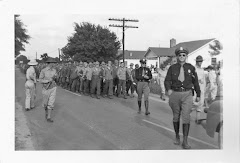 When I wrote Guests Behind the Barbed Wire in 2007, I knew that the German POWs in Camp Aliceville had had a puppet theater and wooden marionettes. I knew that they had staged puppet plays, but I had no names or personal stories to put with the few black and white photos.
When I wrote Guests Behind the Barbed Wire in 2007, I knew that the German POWs in Camp Aliceville had had a puppet theater and wooden marionettes. I knew that they had staged puppet plays, but I had no names or personal stories to put with the few black and white photos.Recently, through information shared by Mary Bess Paluzzi from the Aliceville Museum, I have been able to translate additional materials and put together a fuller picture of Camp Aliceville's puppeteers and puppet plays.
Walter Buettner (1907 to 1990) was a career puppeteer like his father August. By 1929, he had taken some of the old puppet plays his father had presented at carnivals and fairs, refined them a little, and was presenting them at schools as well as fairs.
In 1933, as the Third Reich was gaining power in Germany, puppet plays were banned, and Walter went to work first as a construction laborer at an airport building site between Celle and Lueneberg, then later at the Nobel glycerine works near Geesthacht. In 1940, he was drafted into the marine artillery of the Wehrmacht (the Germany army). There, he found a superior officer who gave him an opportunity to give puppet play performances for his fellow soldiers as a kind of morale booster at the front. Walter worked with his puppets as part of the framework of German army welfare in occupied France until he was captured in 1944.
He was captured by the British and sent to the United States, where he and many other prisoners of war ended up at Camp Aliceville. As Astrid Fuelbier describes his experience in her book, Handpuppen-und Marionetten Theater in Schleswig-Holstein 1920-1960 (Kiel: Ludwig 2002), Walter Buettner did not enjoy working in the compound kitchen, so he set out to search for others in the camp who might work with him to set up a puppet theater.
He was successful in his search. The painter Ernst Hummel was a POW from Karlsruhe. Hummel had once cared for the props and costumes of a marionette theater kept by a Frankfurt dentist (W. J. Caesar) in the attic of his home, and he laid out a plan for a similar theater in the POW camp.
Franz Vernahmer, a POW from Dortmund, was a puppet maker and used his creativity to fashion tools for puppet making from things on hand like rusty files. Herbert Wille had been a sheet metal worker and an electrician, so he became the general handyman for the puppet theater. Others who helped were Karl Heinrich, a teacher and musician from Ebenrode in East Prussia, and a POW from Magdeburg who became the stage manager.
The first puppet production at Camp Aliceville was Indienfahrt (Indian Journey), which Walter had performed earlier in Germany. Later, the group entertained with Schloss Elmenor, based on Oscar Wilde's short story, "The Canterville Ghost." Once the group had acquired actual wooden marionettes (like those of Mephisto and Faust in the photo at top left), they presented other plays, including "The Goose" by Hans Steguweit.
When Camp Aliceville closed, Walter spent additional POW time picking cotton in Mississippi before returning to Germany. His puppets, which had been left behind, were packed up in a large packing case and eventually shipped to him in Germany through the International Red Cross.
After the war, Walter returned to puppet theater as a career. He settled not far from Hamburg in 1951 and built his Kasperhaus (Punch and Judy-type puppet theater) and became known worldwide as Der Heidekasper (The Pagan Punch).
NOTE: The photo of puppets (Faust and Mephisto) used by Walter Buettner and some information in this article are from the Wikipedia article about Walter Buettner. Translation by Ruth B. Cook






No comments:
Post a Comment